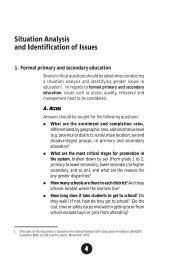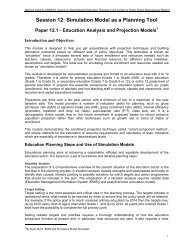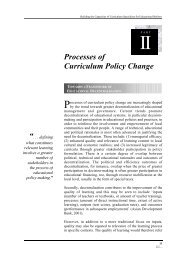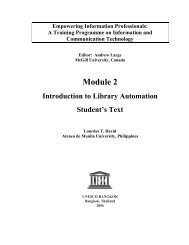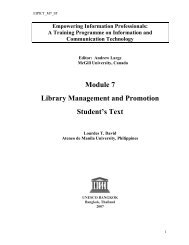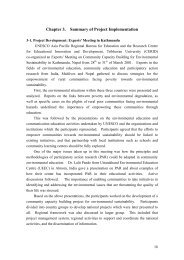Educational Finance in Thailand - UNESCO Bangkok
Educational Finance in Thailand - UNESCO Bangkok
Educational Finance in Thailand - UNESCO Bangkok
Create successful ePaper yourself
Turn your PDF publications into a flip-book with our unique Google optimized e-Paper software.
there any activities that would be better done <strong>in</strong> a centralized fashion, that is, that have<br />
demonstrable economies of scale? How can success or failure be measured? These are<br />
questions that require careful study. A complete and timely <strong>in</strong>formation system would be<br />
an essential <strong>in</strong>gredient, and perhaps this is what the central authority should do.<br />
5.17 One of the most difficult aspects that need to be determ<strong>in</strong>ed is how to construct<br />
quantitative measures of success and failure. One big issue here is time: it will take some<br />
time before one can figure out if decentralization has improved access, efficiency, and<br />
performance. Just to show process changes is <strong>in</strong>sufficient. If the system is still <strong>in</strong>efficient<br />
and underperforms, even if some of the personnel are happier, it is not sufficient reason to<br />
decentralize.<br />
6. Conclusions<br />
6.1 Government <strong>in</strong>tervention can take on a variety of forms, rang<strong>in</strong>g from regulatory<br />
functions, fiscal <strong>in</strong>centives through tax and subsidies, <strong>in</strong>formation dissem<strong>in</strong>ation, and<br />
direct government provision. The mere fact that <strong>in</strong>tervention is justifiable does not<br />
prescribe the form that it should take. Nevertheless broad prescriptions can be made. The<br />
positive externalities argument suggests that <strong>in</strong>centives should be provided to <strong>in</strong>crease<br />
society's production and consumption <strong>in</strong> such areas as basic education as opposed to<br />
tra<strong>in</strong><strong>in</strong>g <strong>in</strong> specific skills, where problems of non-appropriation of benefits are less.<br />
Greater externalities aris<strong>in</strong>g from primary education and literacy programs imply that<br />
these endeavors should receive relatively more attention than higher levels of education.<br />
Where <strong>in</strong>formation imperfection and asymmetry are the problem, programs for<br />
dissem<strong>in</strong>at<strong>in</strong>g <strong>in</strong>formation should be emphasized.<br />
6.2 Measures to reduce the costs of secondary education to low-<strong>in</strong>come rural families<br />
need to be cont<strong>in</strong>ued and properly targeted. Because the majority of the poorly-educated<br />
people work <strong>in</strong> the low-pay<strong>in</strong>g <strong>in</strong>formal sector, efforts should be made to target public -<br />
programs towards this sector. Government programs that touch only those <strong>in</strong> the formal<br />
sector, such as subsidies for government employees’ children, or civil service hous<strong>in</strong>g<br />
assistance, are not likely to improve the lot of the disadvantaged groups.<br />
6.3 The household level analysis shows that <strong>in</strong>come levels have an appreciable effect on<br />
the size of spend<strong>in</strong>g on education, and that the “burden” is greater on lower <strong>in</strong>come<br />
groups. Programs that relieve the f<strong>in</strong>ancial burden on parents should do much to improve<br />
<strong>in</strong>vestment <strong>in</strong> their children's education. For adult workers, <strong>in</strong>creased non-formal<br />
education for primary school leavers should be emphasized. Non-formal and adult<br />
education has contributed significantly to the low rate of illiteracy <strong>in</strong> <strong>Thailand</strong> and should<br />
cont<strong>in</strong>ue to be stressed. But programs that relieve the f<strong>in</strong>ancial burden should not go<br />
aga<strong>in</strong>st efficiency and equity considerations.<br />
6.4 In pr<strong>in</strong>ciple, blanket subsidies and subsidies for non-critical services should be<br />
avoided. User charges should be set <strong>in</strong> l<strong>in</strong>e with costs, with adjustments for equity and<br />
efficiency considerations. The charges can be earmarked to f<strong>in</strong>ance the expansion of<br />
priority services, while <strong>in</strong>creas<strong>in</strong>g rather than decreas<strong>in</strong>g efficiency. Publicly provided<br />
goods and services will be used efficiently if they are priced to reflect the cost of<br />
production as well as externalities and other market imperfections. In contrast, subsidized<br />
(or underpriced) services result <strong>in</strong> excessive consumption and excess demand, and the<br />
taxes needed to pay for such subsidies often create distortions elsewhere <strong>in</strong> the economy.<br />
181



